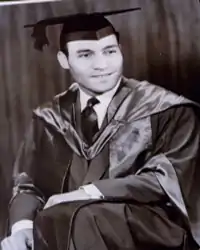Zaghloul El-Naggar
Zaghloul Ragheb Mohammed Al Naggar (Arabic: زغلول النجار, (IPA: [zæɣˈluːl ennɑɡˈɡɑːɾˤ]), born 17 November 1933), also known as Zaghloul El-Naggar,[2] is an Egyptian geologist, Muslim scholar, and author. The main theme of El-Naggar's books has been science in Quran; his philosophy of science is blended with religion. He left his academic career to become the Chairman of Committee of Scientific Notions in the Qur'an, Supreme Council of Islamic Affairs, Cairo, Egypt.
Zaghloul El-Naggar | |
|---|---|
زغلول النجار | |
 | |
| Born | November 17, 1933[1] |
| Nationality | Egyptian |
| Occupation(s) | Geologist, Chairman, Committee of Scientific Notions in the Glorious Qur'an. Supreme Council of Islamic Affairs, Cairo, Egypt. |
| Website | elnaggarzr |
Personal life
He received his bachelor's degree from the University of Cairo. He obtained his PhD in geology from the University of Wales in the United Kingdom in 1963 where his thesis title was "Geology and stratigraphic palaeontology of the Esna-Idfu Region, Nile Valley, Egypt, U.A.R.".[3] El-Naggar is an elected Fellow of the Islamic Academy of Sciences (1988), the Geological Society of Egypt and the American Association of Petroleum Geologists, Tulsa, Oklahoma. He was imprisoned because of his political activism and beliefs during his student life. He was considered a grave threat to secular political establishment of Egypt. He was exiled from Egypt in early 1960s and could return to his country only in 1970.[4]
Works
El-Naggar wrote a book entitled The Geological Concept of Mountains in the Qur'an (2003, ISBN 9773630072). It was published by New Vision when El-Naggar was the chair of geology at King Fahd University of Petroleum and Minerals in Dhahran, Saudi Arabia. This book sold fairly well, leading El-Naggar to leave teaching and become the Chairman of Committee of Scientific Notions in the Qur'an.
El-Naggar published more than 150 scientific studies and articles, none of them peer reviewed, and 45 books in Arabic, English and French. For instance, his book "The issue of Scientific Miracles in the Holy Quran", in Arabic: "قضية الإعجاز العلمي للقرآن و ضوابط التعامل معها ". Many of those publications deal with what are considered to be scientific miracles in Qur'an.[5]
Controversial claims and religion
Naggar said that the power of America would eventually end.[6]
Camel urine was prescribed as a treatment by Zaghloul El-Naggar which has anti cancer properties according to a peer reviewed paper.[7][8]
He engaged in 9/11 denial and spoke twice in the Imam Muhammad ibn Abd al-Wahhab Mosque in Qatar.[9]
Splitting of the moon
Naggar claimed in 2004 that NASA had in 1978 confirmed in a television program the splitting of the moon.[10]
See also
References
- (in Arabic) Biography of Zaghloul El Naggar in ZAYTODAY.com
- "Zaghloul El-naggar - زغلول النجار - Dourous on Assabile". www.assabile.com. Retrieved 2023-02-08.
- Zaghloul Raghib Mohammed El-Naggar dissertant (1963). Geology and stratigraphic palaeontology of the Esna-Idfu Region, Nile Valley, Egypt, U.A.R. / Zaghloul Raghib Mohammed El-Naggar (Thesis). Thesis.
- The Geological Concept of Mountains in the Qur'an In NEWVISION Website
- Ahmad Dallal, Science and the Qur'an, Encyclopedia of the Qur'an
- "Egyptian Cleric Zaghloul Al-Naggar: Israel Must Be Destroyed. America Will Be Dissipated to Nothing". MEMRI. April 1, 2006.
- Fayed, Shaimaa (2012-10-10). "Egypt's radical preachers enjoying freedom of airwaves". Reuters. Retrieved 2016-01-08.
- "Egypt media becomes free platform for radical clerics". ARAB TIMES. 2013-08-21. Archived from the original on August 21, 2013. Retrieved 2016-01-08.
- Gilligan, Andrew (27 Sep 2014). "The 'Club Med for terrorists'". The Telegraph.
- Book: Treasures in the Sunnah - A Scientific Approach, Zaghloul El Naggar, pub. Al-Falah Foundation for Translation, Publication, and Distribution, 2004, ISBN 978-977-363-044-7 OCLC 795325076, p41-43, on Google books and cited on the author's Web site Archived 2014-05-19 at the Wayback Machine